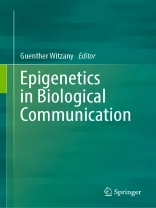Every cell, tissue, organ and organism is competent to use signs to exchange information reaching common coordinations and organisations of both single cell and group behavior. These sign-mediated interactions we term biological communication. The regulatory system that works in development, morphology, cell fate and identity, physiology, genetic instructions, immunity, memory/learning, physical and mental disease depends on epigenetic marks. The communication of cells, persistent viruses and their defectives such as mobile genetic elements and RNA networks ensures both the transport of regulatory instructions and the reprogramming of these instructions. But how are the different states of the epigenome orchestrated? The epigenetic pathways respond to various signaling cues such as DNA methylation, histone variants, histone modifications, chromatin structure, nucleosome remodeling, and epigenetic interactions. Epigenetic signals are responsible for the establishment, maintenance and reversal of transcriptional states that are fundamental for the cell’s ability to memorize past events, such as changes in the external environment, socio-sphere or developmental cues. External signals trigger changes in the epigenome, allowing cells to respond dynamically. Internal signals direct activities that are necessary for body maintenance, and repairing damaged tissues and organs. With the emergence of epigenetic memory, organisms can fix historical and context dependent impressive experiences. Evolution from now on learnt to learn. Learning means organisms can avoid reproduction of always the same. This is key to adaptation. However, inheritance of acquired characteristics is only one of the many examples of the explanatory power of epigenetics. Behavioral epigenetics demonstrates the way in which environmental and social experiences produce individual differences in behaviour, cognition, personality, and mental health. This book assembles experts to outline the various motifs of all kinds of epigenetic regulation of cells throughout their lives.
Spis treści
Epigenetics in Biological Communication Integrates.- Epigenetic control of cell fate decisions by enhancer derived long noncoding RNAs.- RNA mediated inheritance of mammalian spermatozoa.- Bi directional transcription double stranded RNA and the implications on genome evolution.- Epigenetic Inheritance.- Epigenetic Processes as Mediators of the Impact of the Social Environment.- Epitranscriptomics Regulating brain plasticity through dynamic RNA modifications.- Perinatal Epigenetic Programming of Functional Brain Circuits.- Genomic risk for schizophrenia the early life environment and the space left for developmental epigenetic plasticity.- Prospective intergenerational consequences of paternal stress experiences on offspring immune health.- Nuclear Pore Complex regulated Transcription and Memory.- Potential Contribution of Retrotransposons to Learning and Memory.- Transposons as environmental stress detectors are eukaryotic genomes evolved to evolve.- Evolution and diversity of DNA methylation in eukaryotes.- Unraveling the Histone Code Exploring the Dynamic Relationship between DNA and Chromatin Structure in Epigenetic Signaling.- The role of CTCF mediated chromatin looping in enhancer promoter communication.- Do inteins serve as mediators of epigenetic inheritance in prokaryotes.- The roles of transposable elements in transgenerational inheritance and genome evolution.- The inheritance of an acquired taste Learning and passing on new food odor preferences in butterflies.- Epigenetic Regulations during Plant Microbe Interactions.- The role of epigenetics communication in the co regulation of holobionts biology interspecies probabilistic epigenesist.
O autorze
Guenther Witzany is philosopher and developed a new philosophy of biology based on the current empirical data in all domains of cellular life, virology and RNA-biology. In a series of books he applied his theory of biocommunication to all organismic kingdoms. Theory of biocommunication is the first and only theory that integrates all living agents empiristically in a non-reductionistic and non-mechanistic way and opens a ground breaking understanding of life through analyses of sign-mediated interactions within and between cells, tissues, organs, and organisms.












